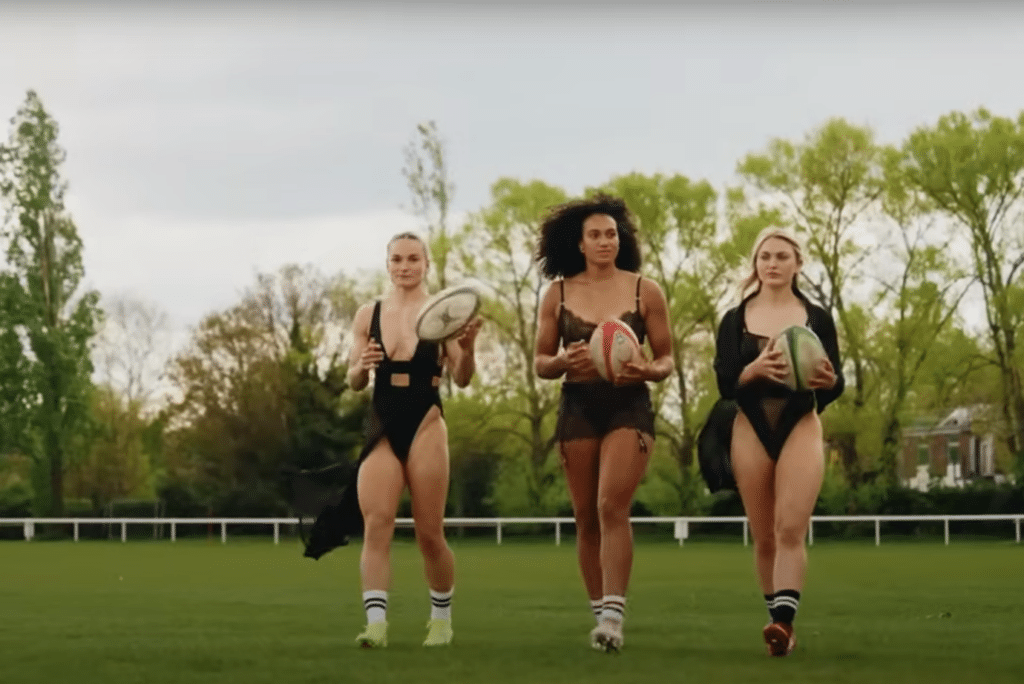If strength is beautiful in its own right, why do we need to still ‘package it up’ in sexy, sheer lace?
Why does lingerie or sex even, constitute ‘femininity”? You cannot be bold, brazen, and feminine in jeans and a turtleneck?
Coco Chanel’s boxy lines and shortened skirts liberated women of the corset (and everything it symbolised). The 1960’s “bra-burners” inspired women to throw away anything and everything that oppressed women. The 80s power suit boldly encouraged women to embrace ambition and femininity in a style all their own.
And yet in 2024, we’re regressing to sportswomen parading around in lingerie on the football pitch to remind the world of a woman’s power, impact and value?
Marketing campaigns such as Bluebella’s latest controversial ‘Strong Is Beautiful’ rugby ad, featuring female athletes in lingerie, are arguably regressive and sexist because they reduce women to mere objects of desire, focused solely on their physical appearance and “how fit they are in bed”, rather than their athletic abilities and accomplishments.
These campaigns perpetuate harmful stereotypes that prioritise a woman’s attractiveness over her skills and achievements, reinforcing the idea that a woman’s value lies in her appearance rather than her talents, whether it be in sport, work or life generally.
Bluebella’s failure to read the room is frankly jaw-dropping, and not the kind of jaw-dropping they were hoping to achieve.
Promoting female athletes in lingerie can also send the message that women must conform to societal standards of beauty to be successful or celebrated, which is both unrealistic and damaging. It reinforces harmful beauty standards and can contribute to body image issues and low self-esteem among women and girls.
There is a reason that now, more than ever, women and girls (some still in high school) are spending thousands of dollars on cosmetic surgery, beauty treatments, waist trainers, diet drugs and photo editors.
Don’t get me wrong, I know these products make several women happy, including me. Who doesn’t like a “freshen up” or “pick me up”? And we’re entitled to treat ourselves and do what makes us feel genuinely good. It’s the reasons why we’re driven to get these things done, and the extent we might go to, which concern me.
We spend a fortune on changing ourselves to meet societal standards and to overcome insecurities triggered by ads like these, only to then spend a further fortune on therapy, self-help books, healers and retreats to remind ourselves of our inherent worth and value. We encounter conflicting messages daily: I watch women in music videos, singing about being independent and not needing a man, yet ‘twerking’ in g-strings and shaking their ‘under boob cleavage’.
I see social media posts featuring affirmations about female empowerment and freedom of choice and yet the authors have airbrushed their waists, cleavage, facial features and complexion, and they’re wearing rented designer outfits because “hot people get followers”.
In an era where all genders are collectively taking a stand against domestic violence and sexual offending, it’s finally time to stop focusing so much on reactive measures (punishment and naming and shaming) and rather, focus on what’s really needed here and that is shifting these narratives and calling out these ads to prevent violence against women.
Violence is perpetuated through childhood trauma, learned behaviours, social stereotypes and a lack of education amongst many other factors. It is a vicious cycle. Consider how the system and ads like these are in fact negating preventative strategies.
Most states around the country have recently reformed sexual offence laws to introduce affirmative consent laws. The shift to an affirmative consent model places responsibility on sexual offenders rather than victims. Intimate partners are now required to proactively obtain each other’s consent prior to engaging in sexual contact. This is a form of preventative strategy.
In campaigns against sexual violence, the issue of consent and the normalisation of sexually coercive behaviours are central to a “rape culture”. This is a cultural ethos, or mindset, characterised by sexual norms, victim-blaming, stereotypes, misconceptions about consent and associated low reporting rates of sexual violence.
Driving this “rape culture” is this general societal attitude that women are sexual beings, better off in bed than on the field or in the office. It’s a bold statement to make but it is the extreme repercussions of perpetuating messages that sex is strength.
Overall, featuring female athletes in lingerie in ads is not empowering. It undermines their achievements and reduces them to sexual objects. It’s important to celebrate and respect female athletes for their skills, dedication, and hard work, rather than objectifying them for commercial gain.



